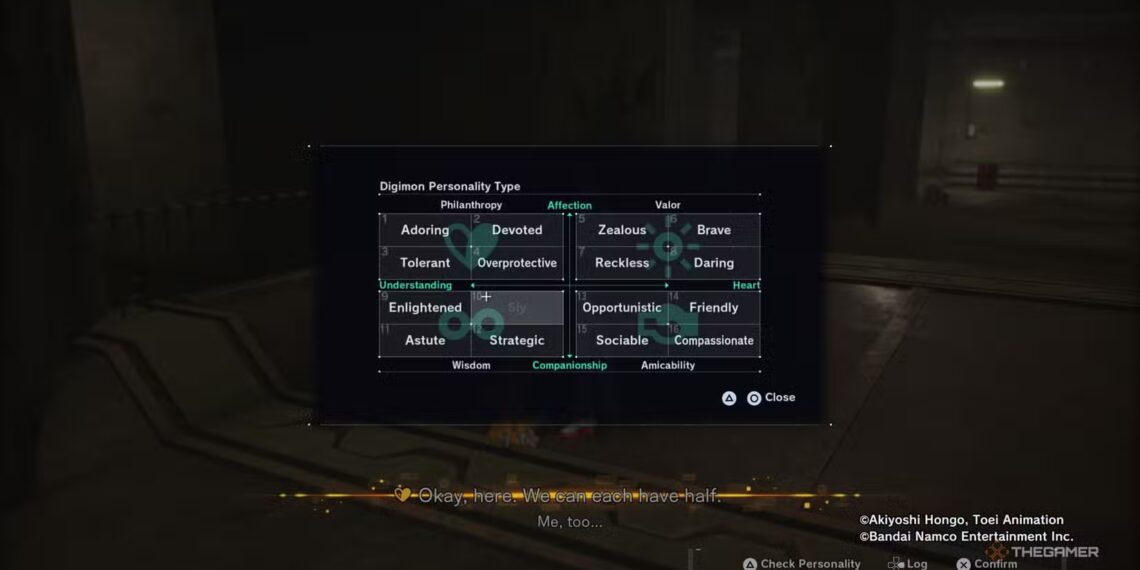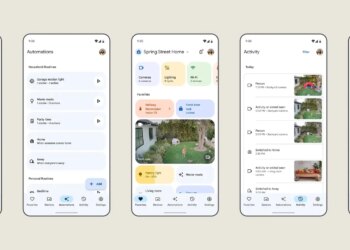Select Language:
When the franchise first appeared, Digimon quickly became a worldwide sensation. It introduced a wide variety of memorable digital creatures. Their visual designs help us remember them, but it’s their unique personalities that really make each Digimon special. You can easily tell Impmon’s mischievous behavior from Agumon’s cheerful heroics.
Digimon Story Time Stranger continues the tradition of emphasizing personality as a core part of the game experience. The way your Digimon grow and how their abilities show up in battles depends not just on their Digivolutions and skills, but also on who they are as individuals—digital personalities. You see, it’s all about their digital characters.
The Four Quadrants
There are 16 personality types in Digimon Story Time Stranger, divided into four groups, or quadrants, with four types each. The image above shows all 16, and you’ll notice arrows in the middle—these are important for understanding how personalities can shift.
Each group—Philanthropy, Valor, Wisdom, and Amicability—splits into specific subtypes. For example, Philanthropy includes Adoring, Devoted, Tolerant, and Overprotective. Valor covers Zealous, Brave, Reckless, and Daring, and so on.
- Digimon in the Philanthropy group tend to level up faster in SPI (Spirit). This makes them great for healing roles, as SPI affects their healing skills.
- Those in Valor increase their Attack (ATK) more quickly, ideal for physical attackers. If your Digimon relies on magic, this is less useful unless a skill changes physical attacks to magic.
- Wisdom types gain Intelligence (INT) faster, perfect for magical damage dealers.
- Digimon in Amicability level up Defense (DEF) quicker, making them good tanks capable of absorbing damage.
The Benefits of Personalities
But it’s not just about the main groups. Each group contains subtypes that influence stats further. Think of the main groups as one layer of control and the subtypes as a second, finer layer.
For example, a Valor Digimon with the Zealous subtype will get attack and speed bonuses as it levels. The same applies to other subtypes, affecting different stats.
Personality Skills
Beyond stats, each Digimon can have one of 32 unique Personality Skills, which only one Digimon can have at a time. You get a chance to learn or change a skill whenever your Digimon’s personality shifts. This can happen during gameplay, especially when their subtype changes, giving you opportunities to swap skills.
For example, a Digimon with the Steadfast Emotion skill boosts its INT when HP drops below 90%. The lower its health, the stronger the boost—useful in tough battles.
Influencing Personality Changes
When you talk to your Digimon during exploration—like in dungeons or other areas—you can answer questions they ask. Your answers influence their personalities, gradually shifting their subtypes. These shifts happen diagonally across the personality grid. The arrows you saw earlier indicate these diagonal paths.
- Your answers are associated with the symbols next to them: a heart for Philanthropy, a sun for Valor, an infinity for Wisdom, and a rectangle with a sphere for Amicability.
- Ignoring an answer usually means no personality change.
In practice, answering questions can steer your Digimon’s personality in different directions, helping you customize its growth and skills to suit your strategy.
Changing Personality Subtypes and Skills
A Digimon’s personality is assigned randomly upon its creation—called “conversion.” Sometimes you might want a different personality because the current one isn’t ideal.
You can change personalities by answering questions during gameplay. If you prefer, you can shift a Digimon’s subtype intentionally and then switch back. When you explore areas with your Digimon in view, you can talk to it every few minutes or so, answering its questions.
The answers can cause your Digimon’s personality to shift diagonally. For example, if your IceDevimon is currently Sly, a question might make it become Astute—the diagonal from Sly. When this happens, you’ll be given the option to replace its current Personality Skill with a new one associated with the new subtype, like Steadfast Emotion.
You’re not stuck with a subtype forever—changing and adjusting is possible. After swapping the skill, keep answering questions to steer your Digimon back to your preferred personality. When it shifts again, you can decline further changes to maintain your desired subtype.
This system allows you to fine-tune your Digimon’s stats and skills separately from their origin, giving you greater control over their growth and abilities, even if the initial personality isn’t perfect.







